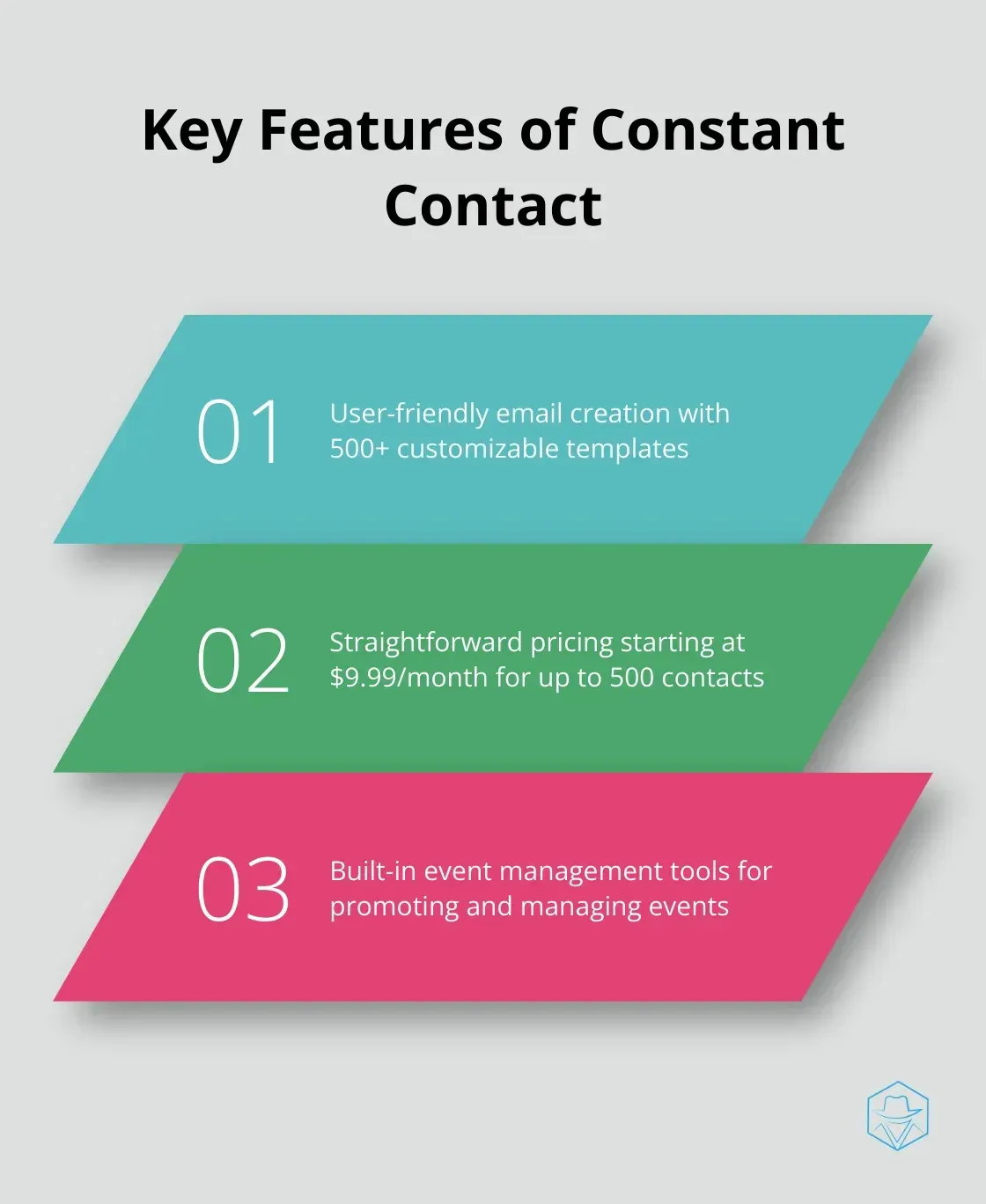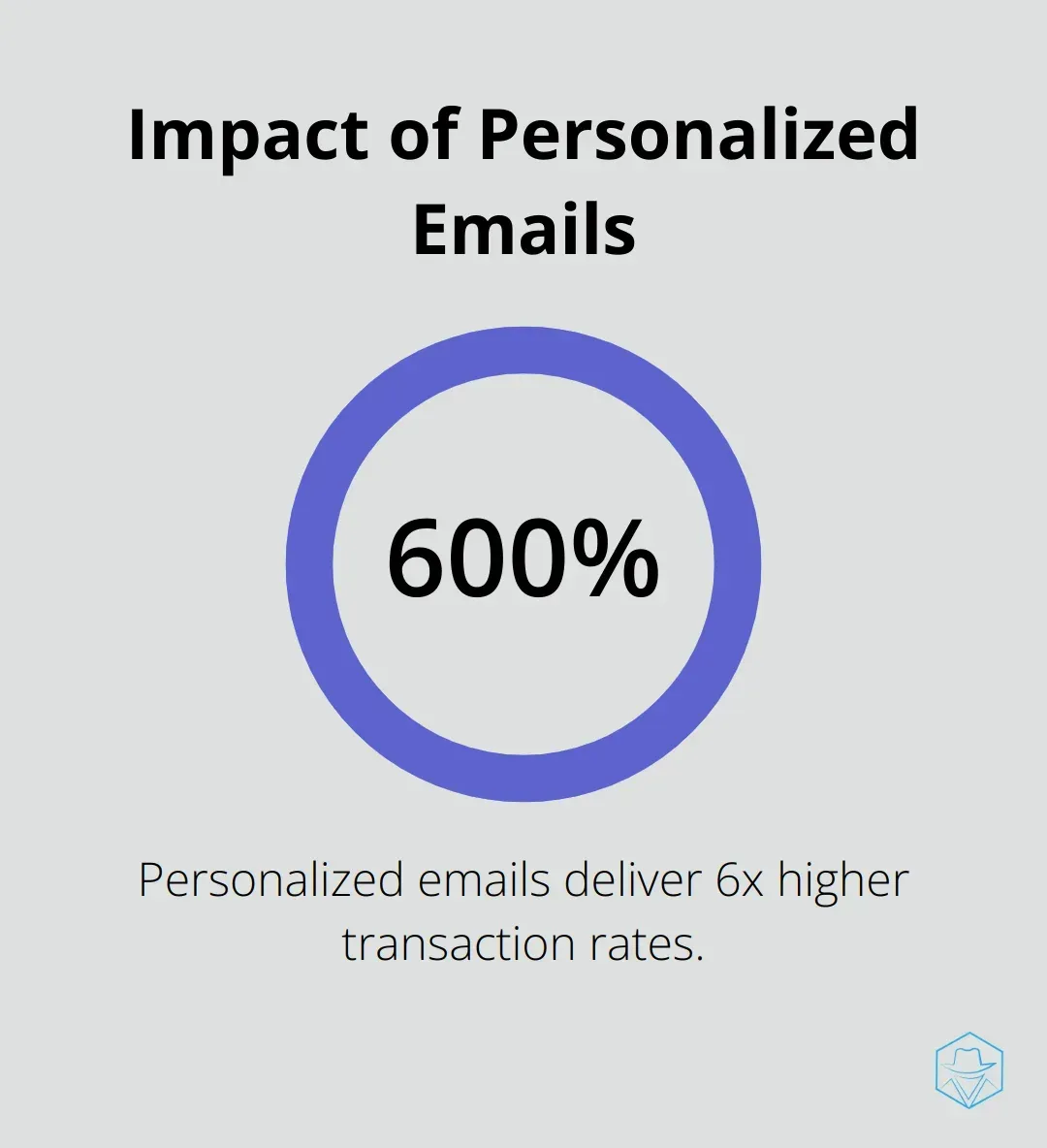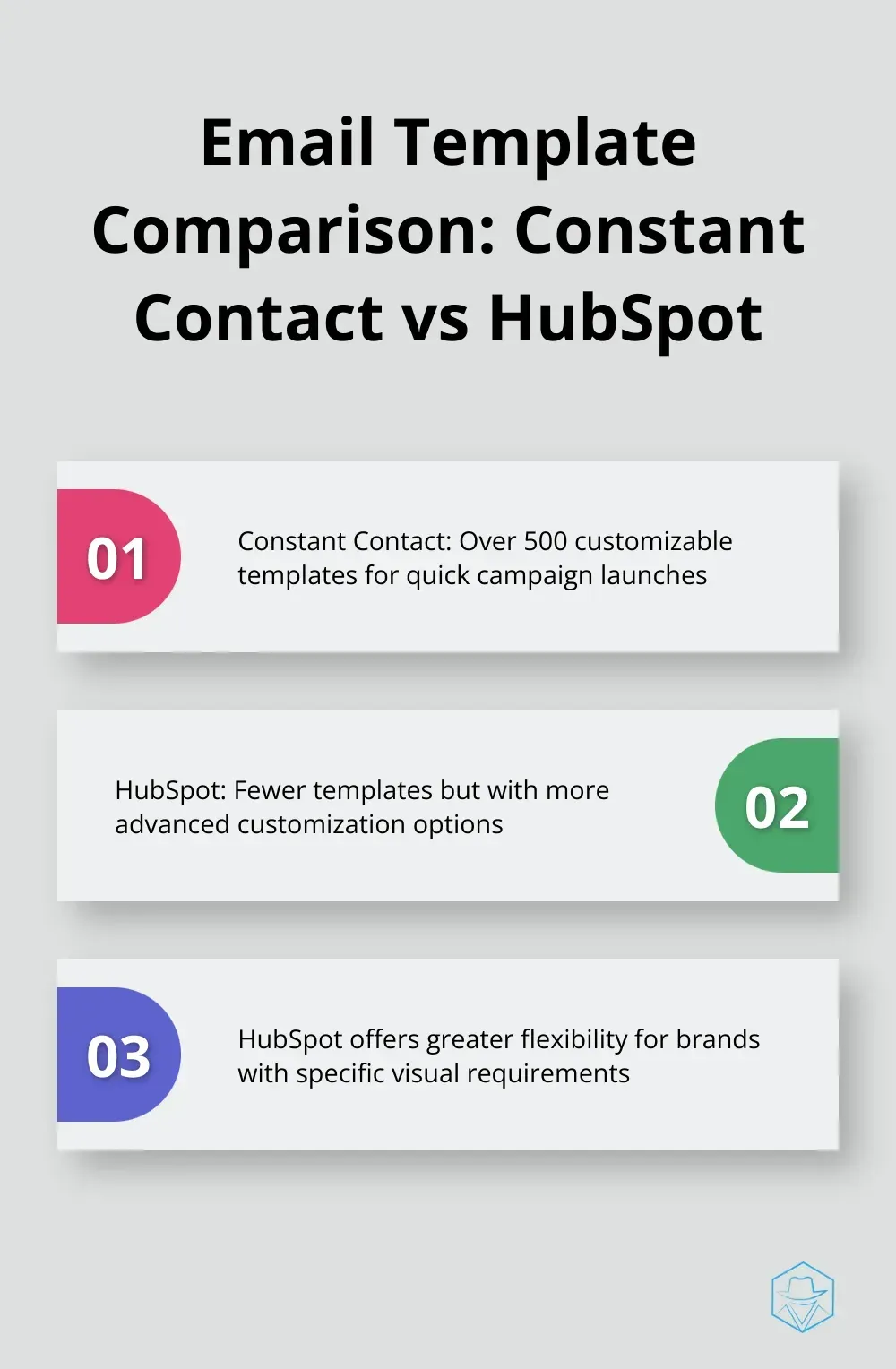Constant Contact or HubSpot: Best Email Solution?

At Drop Cowboy, we understand the importance of choosing the right email marketing solution for your business.
In this post, we’ll compare two popular options: Constant Contact vs HubSpot.
We’ll examine their features, pricing, and target audiences to help you make an informed decision.
What Makes Constant Contact Stand Out?
User-Friendly Email Creation
Constant Contact excels in simplicity and ease of use. The platform offers over 500 customizable templates, enabling users to create professional-looking emails without design expertise. Its drag-and-drop interface allows for quick adjustments, which reduces the learning curve for new users.
Straightforward Pricing Structure
Constant Contact’s pricing model scales with your business. As of April 2025, plans start at $9.99 per month for up to 500 contacts. This structure makes it accessible for small businesses and allows for growth without immediate significant cost increases.
Event Management and Beyond
While Constant Contact primarily focuses on email marketing, it offers additional tools that expand its utility. The built-in event management feature stands out, allowing businesses to promote events, sell tickets, and manage attendees directly through the platform. This integration streamlines operations for businesses that frequently host workshops, webinars, or other events.
Small Business-Focused Integrations
Constant Contact provides integrations with popular small business tools and platforms. These include e-commerce solutions (like Shopify and WooCommerce) and social media platforms (such as Facebook and Instagram). While not as extensive as some competitors, these integrations cover the essentials for many small businesses looking to connect their email marketing with other key business operations.

Targeted Audience Appeal
Constant Contact has carved out a niche in the email marketing landscape, particularly for small businesses and nonprofits. The platform’s strengths in simplicity and ease of use prove valuable for organizations with limited technical resources.
As we transition to examining HubSpot’s email marketing capabilities, it’s important to note that while Constant Contact offers a solid foundation for small businesses, larger organizations or those with more complex needs might require a more comprehensive solution.
What Sets HubSpot’s Email Marketing Apart?
Advanced Personalization and Segmentation
HubSpot’s email marketing excels in creating highly targeted campaigns. Users can segment their audience based on various criteria, including behavior, demographics, and engagement history. This granularity allows for hyper-personalized content that resonates with recipients. A study by Epsilon found that personalized emails deliver 6x higher transaction rates.

Data-Driven Campaign Optimization
HubSpot’s strength lies in its analytics capabilities. The platform provides detailed insights into email performance (open rates, click-through rates, and conversion metrics). HubSpot’s A/B testing feature allows marketers to experiment with different elements of their emails, from subject lines to content and design. This data-driven approach helps businesses refine their email strategies for maximum impact.
Seamless CRM Integration
HubSpot’s email marketing tool integrates with its CRM, providing a unified view of customer interactions. This integration allows for more targeted and relevant email communications based on a contact’s history with your business. You can automatically trigger follow-up emails based on specific actions a lead takes on your website or in response to previous emails.
Scalable Pricing Structure
HubSpot’s pricing structure is tiered, starting with a free plan that includes basic email marketing features. Paid plans range from $45 to over $3,200 per month (depending on the features and contact limit needed). This scalable pricing model makes HubSpot accessible to growing businesses while providing enterprise-level solutions for larger organizations.
Learning Curve and Complexity
While HubSpot offers powerful features, it’s important to note that the learning curve can be steeper compared to simpler platforms. However, for businesses looking to scale their email marketing efforts and integrate them with broader marketing strategies, HubSpot provides a robust solution. HubSpot’s Inbound Marketing Certification can be valuable for marketers looking to master the platform and enhance their skills.
As we compare HubSpot’s comprehensive approach to email marketing with Constant Contact’s more streamlined offering, it’s clear that each platform caters to different business needs and sizes. In the next section, we’ll directly compare these two solutions to help you determine which might be the best fit for your organization.
Which Platform Offers the Best User Experience?
Interface and Ease of Use
Constant Contact stands out with its intuitive interface, making it an excellent choice for small businesses or email marketing novices. Its drag-and-drop editor enables users to create professional-looking emails quickly. HubSpot’s interface, while sleek and modern, requires more time to master due to its comprehensive feature set. Businesses that plan to invest in advanced marketing automation and analytics will find the initial time investment in learning HubSpot worthwhile.
Template Design and Customization Options
Both platforms provide a wide range of email templates, but they cater to different needs. Constant Contact offers over 500 customizable templates, which benefits businesses that need to launch campaigns quickly. HubSpot provides fewer templates but offers more advanced customization options. This flexibility in design proves valuable for brands with specific visual requirements or those aiming to create highly personalized campaigns.

Automation and Workflow Capabilities
HubSpot takes the lead in automation with its sophisticated workflow builder. Users can create complex, multi-step campaigns that respond to subscriber behavior in real-time. This level of automation proves particularly valuable for businesses with longer sales cycles or those that aim to nurture leads over time. Constant Contact offers basic automation features (like welcome series and birthday emails), which suffice for simpler marketing strategies but may not meet more complex needs.
Analytics and Reporting Tools
HubSpot’s analytics capabilities provide more comprehensive insights, showing not just email performance, but also how email campaigns contribute to overall marketing and sales goals. The platform’s ability to track customer journeys across multiple touchpoints gives businesses a holistic view of their marketing efforts. Constant Contact provides essential metrics (such as open rates and click-through rates), which allow for basic campaign optimization but may not offer the depth required for advanced marketing strategies.
Customer Support and Resources
Both platforms offer robust customer support, but they differ in approach. Constant Contact provides 24/7 phone support, which can prove invaluable for small businesses that need immediate assistance. HubSpot offers extensive support options and places a strong emphasis on self-service learning through its HubSpot Academy. This resource offers free certifications and courses, empowering users to become proficient in not just the platform, but in overall marketing strategies.
Final Thoughts
Constant Contact and HubSpot offer distinct advantages for different business needs. Constant Contact excels in user-friendliness and simplicity, making it ideal for small businesses and nonprofits with limited resources. HubSpot provides a comprehensive solution with advanced features, suitable for growing businesses with complex marketing requirements.
Your choice between Constant Contact vs HubSpot should align with your long-term marketing strategy and available resources. Consider factors such as your need for advanced automation, analytics depth, and integration capabilities when making your decision. The right email marketing solution can significantly impact your business growth and customer engagement.
We at Drop Cowboy offer a cutting-edge communication platform that complements email marketing strategies. Our ringless voicemail and SMS features (coupled with AI-powered voice cloning) can help you create personalized, multi-channel campaigns that boost engagement and drive results. The most effective email marketing strategy combines the right tools with a deep understanding of your audience and clear business objectives.
Ryan
Ryan is a dedicated expert in SMS and Ringless Voicemail, constantly exploring new ways to optimize communication and engagement through these channels. He’s passionate about leveraging automation and personalization to enhance outreach strategies.
Related posts

June 2, 2025
How to Streamline Accounting with Microsoft Dynamics GP
Streamline accounting with Microsoft Dynamics GP, boosting efficiency and accuracy. Uncover tools and tips for seamless financial management.

March 6, 2025
Choosing the Best Ringless Voicemail Software
Choose the best ringless voicemail software with expert tips, key features, and real data for seamless communication.

May 23, 2025
Turnkey Lender Reviews: Is It Right for Your Business?
Explore Turnkey Lender reviews to see if it’s the ideal solution for your business needs. Make informed decisions with real user insights.

August 4, 2025
Why does my phone go to voicemail
Explore the reasons why your phone goes to voicemail and learn practical solutions for uninterrupted communication. Discover more in our informative guide.

April 14, 2025
CJ Dropshipping USA: Benefits for Online Sellers
Explore the advantages of CJ Dropshipping USA for online sellers, including efficient logistics, product variety, and cost-effective solutions.

September 3, 2025
Leveraging AI-Powered Personalization in Your Marketing Funnel
Maximize marketing success with AI-powered personalization to enhance engagement, boost conversions, and tailor customer experiences within your funnel.